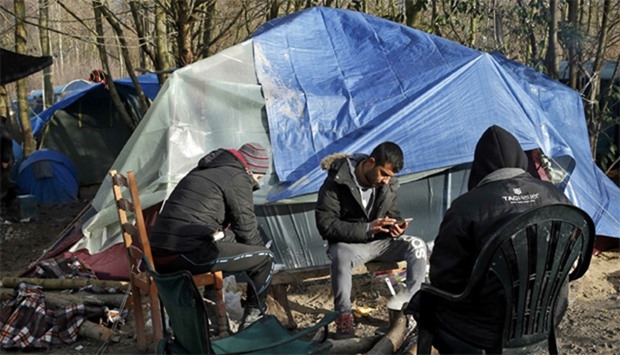Known as The Jungle, the camp in the northern port city of Calais is home to thousands of refugees and migrants who have gathered at the site in the hope of somehow getting to Britain.
With the mild weather ending and the mercury set to plummet, the French authorities are trying to persuade around a quarter of the camp's 4,000 residents to move out of their ramshackle homes into metal shipping containers kitted out with heaters, electrical sockets and cots for babies.
But the plans have been met with defiance, with many people unhappy about leaving an area where they have established a community and concerned that the new security measures involved will be used against them.
Instead of moving into the containers, many migrants were on Thursday picking up their ramshackle tents and shelters and, with the help of activists, moving them deeper into the camp on the back of trucks, an AFP correspondent said.
The aim appeared to be to move their shacks closer together in order to complicate any efforts by the authorities to remove them by force.
Sikander Noristany, a 42-year-old representative of the Afghan community, said people were reluctant to leave behind the shops and cafes they have created in the camp and anxious about being asked to submit palm prints in order to move into the containers.
- Hand-scan concerns -
‘They say the new containers are better but there are no showers or kitchens,’ he told AFP.
‘The main thing people are worried about is the hand scanners... People worry (the hand prints) will be used to send them back here from England.’
Officials insist the system is simply a way of increasing security and deny they are trying to restrict the migrants' movements.
‘People do not come to The Jungle to sleep and eat. They are here to try to get to England. They are worried it will be harder to do that from the containers because they look like a prison,’ Noristany said.
‘A few people have signed up for the new containers but then disappeared. No one I have spoken to wants to go.’
The group that manages the containers said 144 people had signed up to move into the new accommodation and they expected more to join them.
‘We are expecting to be accommodating 200 people this evening,’ said Stephane Duval, the manager of ‘Vie active’.
- Briton goes on trial -
Later on Thursday, a former British soldier was to go on trial in nearby Boulogne accused of trying to smuggle a toddler out of the camp and take her to England in a case that has sharply divided opinion.
Rob Lawrie is accused of trying to take four-year-old Bahar Ahmadi out of the camp, telling AFP in November he had acted at the request of her father.
‘Who in their right mind would rather a child live in a tent on a chemical dump than allow me to take that one child to her family five miles (eight kilometres) from where I live?’ said Lawrie, a father-of four.
A frequent visitor to the camp, Lawrie said her father had asked him several times before he agreed to try.
But French police stopped Lawrie with the girl after he passed British customs at French port when sniffer dogs detected two Eritrean migrants who had sneaked into the back of his truck.
An online petition in support of Lawrie has attracted 120,000 signatures in France and 50,000 signatures in Britain.
Although migrants have been gathering around Calais for years, The Jungle grew rapidly in early 2015 as the migration crisis took hold.
Most of its inhabitants are from war zones such as Syria, Afghanistan and Iraq or have fled persecution and poverty in African countries such as Sudan and Eritrea.
Numbers peaked at around 6,000 in the summer but have fluctuated as many pay mafia groups to smuggle them aboard lorries crossing the Channel by ferry.
The issue has also become a political priority for the French government after the far-right National Front (FN) of Marine Le Pen gained a record score in the northern region last month, partly fuelled by the migrant issue.

